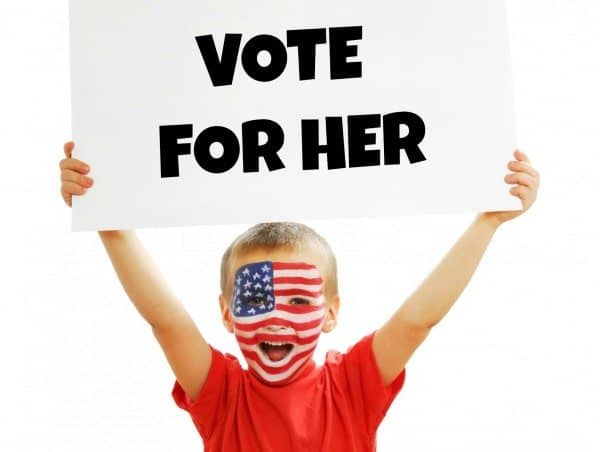
Talking To Your Kids About Politics
When my son Sam was in the first grade, the kids in his class were really excited about the 2008 Presidential election. They constantly asked each other if their parents were voting for Obama or McCain and had a lot of good-natured fun talking about it. Then one day, a classmate’s dad joined them for lunch and Sam asked him who he was voting for. The dad answered, “McCain,” and when Sam told him that his parents were voting for Obama, the dad responded with, “Then your parents must like giving most of their money away to other people.”
Oh, no he di’int. (Did’int? Din’t? I can never get that right.)
At any rate, I was completely floored that a grown man would say something so rude to a 7-year-old kid. It really upset me. But it also made me realize that as responsible parents, we need to show our kids how to be respectful of people with different political views. Especially now, when our kids are paying close attention to everything we’re saying about the upcoming election. (Or, in some cases, yelling about it.)
I’m by no means a political expert, but I definitely feel that if we want the significance of the Presidential election to be understood by our kids, and we want them to grow up to be responsible voters, we need to talk to them about politics in a thoughtful, intelligent manner. Here are just a few ways I think we can do that:
1. Be Respectful of the Office, Even If You Don’t Respect the Person In It
Kids naturally defer to authority. They’re taught to trust and honor those in power, like their principals and coaches. So when they see or hear something negative about the President of the United States (like the “Obama is a Traitor” flyers that someone hung all over my neighborhood or the “Bush Is A Punk Ass Chump” bumper stickers prevalent in Austin), it confuses them. They don’t understand the issues and nuances that go into a grown-up’s opinion; they only notice the name-calling—something we repeatedly tell them not to do. So rather than saying a certain politician is “a witch” or “an idiot,” maybe it’s better to say, “I don’t like how she does her job.”
2. Don’t Make It Personal
A friend of mine was talking about her neighbor, who she doesn’t like, and said, in front of my kids, “He just put up a yard sign for Senator X, which just shows he’s a jerk who doesn’t care about the environment.” Ouch. She basically gave the kids the impression that only stupid people would support that candidate’s party and of course, that’s not true. Nothing’s ever that black and white. So while it might be hard to resist them, personal slights are neither helpful nor necessary when discussing politics.
3. Base Your Arguments in Facts
I’m always surprised by the number of adults who make bold political statements and don’t back them up with any facts. (And many of them are famous media personalities.) It’s incredibly important to substantiate your opinions so your kids learn how to make a real argument and engage in real debate. If you say you oppose illegal immigration, explain your reasons why. After all, if your daughter came home from school and said she hated a classmate, wouldn’t you expect a better reason why from her than “Because?”
4. Remember That Politics Is Theater
As adults, we know that a lot of what we see and hear from politicians and pundits is nothing but posturing. There’s a lot of blustering and posing and making of false, inflammatory statements. But since kids aren’t as savvy as we are, it’s on us to explain why a candidate or one of his supporters said something last year that he’s completely denying saying this year. Kids know that they don’t get away with that sort of behavior, so it puzzles them when it’s done by adults. (It puzzles me, too.)
5. Encourage Kids to Form Their Own Opinions
I grew up with Republican parents who aren’t exactly thrilled that I’m a life-long Democrat. (I still get crap for voting for Dukakis.) But that said, they never once told me how I should think or vote when I was growing up. Instead, they encouraged me to learn as much as I could about politics and decide for myself where my allegiances lie. And that’s exactly how I hope to raise my own kids—with them knowing it’s okay to have thoughts, opinions and a world view that might not be the same as their parents’.
Although, be sure to check back with me on that in 2020 when Sam’s finally old enough to vote. I might be feeling a little differently then.
How are you talking to your kids about the upcoming election?

